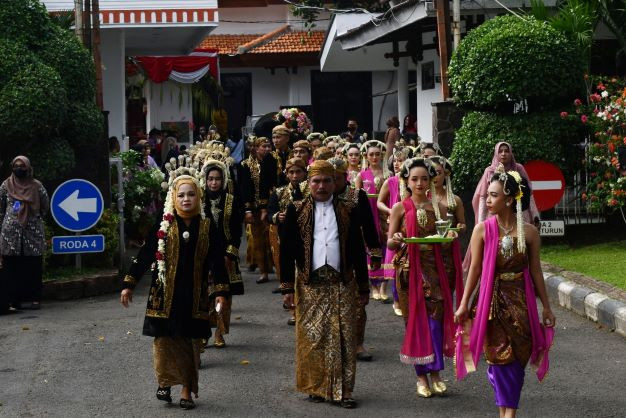Popular Reads
Top Results
Can't find what you're looking for?
View all search resultsPopular Reads
Top Results
Can't find what you're looking for?
View all search resultsInterfaith marriage made impossible
The rising number of interfaith marriages is an inevitable consequence of Indonesia becoming a more open and mixed society.
Change text size
Gift Premium Articles
to Anyone
M
arriage between people of different faiths has become more difficult, if not impossible, following a Supreme Court circular letter telling district courts to stop giving legitimacy to these unions. These marriages will no longer be recognized by the state and this also raises questions about the status of their children.
Previously, the district court ruling would be used by these mixed couples to file with the civil registry office.
The Supreme Court is responding to pressure from Muslim conservatives who are alarmed at the rising number of interfaith unions and have called for stricter adherence to a 1974 law that only recognizes marriages if performed by a religious institution. This effectively requires one side of the couple to convert to the other’s faith. This law is problematic from human rights, constitutional and religious perspectives.
No one should be forced to embrace a faith they do not believe in. Denying state recognition of interfaith marriages has implications on the couple’s rights to public services, especially those that require proof of their union. Article 16 of the Universal Declaration of Human Rights says “Men and women of full age, without any limitation due to race, nationality or religion, have the right to marry and to found a family. They are entitled to equal rights as to marriage, during marriage and at its dissolution.”
Strangely, it was Vice President Ma’ruf Amin, a staunch Muslim conservative, who raised the issue about the status of children from these marriages when he asked the Supreme Court to follow up its circular letter with a clarification on the children’s rights to inheritance.
Previously, district courts had an innovative solution. A couple would go to one of the religious institutions to perform the marriage, one that allowed each to stay true to their faith. They then would seek a court’s legitimacy before filing with the civil registry office.
This option is now gone.
While the 1974 law on marriage says only religious institutions, rather than the state, have the power to perform marriages, the law should carve out exceptions for marriages of people of different religions, and for marriages of people outside the six officially recognized faiths – Islam, Christianity, Catholicism, Hinduism, Buddhism and Confucianism.
Of course, it would have been much easier if the civil registry office was simply allowed to accept all marriages, not just of couples of different faiths, as is widely practiced in many other countries. But Indonesia decided to make it difficult, and now, with the Supreme Court circular letter, next to impossible.
The rising number of interfaith marriages is an inevitable consequence of Indonesia becoming a more open and mixed society with people of different races, nationalities and faiths interacting every day. We are seeing more mixed marriages, not just of different faiths, but also of different races and nationalities.
The Supreme Court’s circular letter is going against this trend toward more openness, by succumbing to pressures from religious conservatives. Rather than making it difficult for couples to get married, the state and the Supreme Court should facilitate them.
Getting married is already a complex and challenging affair, particularly for people of different faiths. They have to explain to relatives who may have objections. There is the paperwork to go through to get a religious institution to agree to perform the marriage without insisting on both having the same faith. Next, they have to go to a court to get a stamp of approval before filing it with the civil registry office.
There is another option available, already practiced by couples with money. Many mixed couples go overseas to get married at the civil registry office, with Singapore and Australia among the most favorite destinations, bypassing the complexity in Indonesia. They return home after their honeymoon and then file the foreign marriage certificate with the local civil registry office. And they will happily live ever after.











